#linguistics nerd
Explore tagged Tumblr posts
Text
This is my Patreon for the game I'm making! It's a visual novel that's designed to teach you a language while you play. The full details are in that (free) post, but here's a quick run-down:
First you pick a language. Then you're dropped into a city where people ONLY speak that language. The game introduces you to some very basic vocabulary and grammar with the help of a character who speaks your native language, and then it just lets you do whatever. There's a huge cast of characters all with their own lives and stories and struggles, and instead of studying big, boring blocks of verb tenses, you just talk to them. The game tracks what words and grammar you've seen before, so new conversations only unlock as you're ready for them and you're never overwhelmed by too many new words when you're just trying to talk to the cute barista.
There's going to be five locations and fourteen characters in the initial release in August 2025, and another three locations and twelve characters if the Kickstarter reaches the stretch goals for them. The languages slated at the moment are English, Spanish, Farsi, and Hebrew, but I'm hoping to get at least one or two more lined up before release!
Anyways I'm hugely excited about this, expect to hear a lot about it lol
8 notes
·
View notes
Text
i fucking love first/second/third person tenses because it’s so like. idk funny? kind of accurate to the human experience imo. like:
*I* am the First type of person ~points towards self
*You* are the Second type of person ~points towards you
*He/She/They* are the Third type of person ~gestures to everyone else
it just Makes Sense
#mine#linguistics#linguistics nerd#fanfic writing#existential thoughts#shower thoughts#grammar#grammar nerd#lol
0 notes
Text
youtube
please i need you to watch this deadpan german linguistics professor making an incredibly catchy nerd pop song and dancing it's been stuck in my head all day
#linguistics#linguist humour#i put the antics back in semantics#you'll scream for more more more morphology#christian uffmann#linguistics professors say the darnedest things#songs#pop songs#nerd pop#Youtube
757 notes
·
View notes
Text
How to Actually Learn a Language (Without Wasting Time)
Polyglots will do anything to sell you something, so here’s the fastest and most basic technique based on my research.
—
Step 1 – Getting the Absolute Basics In
This is where most people already get lost. If you search social media for how to start, the advice isn’t necessarily bad, but it often makes you dependent on a single resource, usually an app that will eventually try to charge you. Duolingo, for example, has turned into a mega-corporation that perfected gamification to keep you on the app.
Remember: free apps make money by keeping you on their platform, not by helping you become fluent.
At this stage, the goal is not to gain conversational skills but to avoid overwhelming yourself and get a feel for what you’re actually getting into. All my recommended resources are free because I believe learning a language should be a basic right. I wouldn’t advise spending any money until you’re sure you’ll stick with it. Otherwise, it can turn into a toxic “but I paid for this, so I have to keep going” mindset that drains all the fun out of learning.
• Language Transfer – Highly recommended for Spanish, Arabic, Turkish, German, Greek, Italian, Swahili, and French.
• Textbooks – Simply search for [language] textbook PDF, or check LibGen and the Internet Archive. Don’t overthink which book to choose—it doesn’t matter much.
• Podcasts – Coffee Break is a solid choice for many languages.
• YouTube Channels – Join r/Learn[language] on Reddit and find recommendations.
—
Step 2 – The 20/80 Principle
The idea is that 20% of words make up 80% of everyday speech.
What you’re going to do:
Search “Most common words [language] PDF”.
This list is now your best friend
For flashcards, I highly recommend AnkiPro. It lets you import pre-made lists for Anki/Quizlet and has an archive where you’ll definitely find the most common words. But it lacks audio. The real Anki program has it, but only on PC (unless you’re willing to pay $30 for the mobile app). Use AnkiPro for now—we’ll come back to repeating phrases later. In the meantime, find a YouTube video with the most common words pronounced, or use Google Translate for audio.
(Knowt is a free alternative for Quizlet if you prefer that)
These lists will spare you from learning unnecessary vocabulary at this stage. Spaced repetition (which Anki uses) can take longer, but it’s worth it because you want these words to stick. Anki will only introduce a small number of new words per day. Once you start new words, write phrases using them. Doesn’t matter if they’re random just try to use them.
—
Step 3 – The First Breakup With the Language
This isn’t really a step, but I have to mention it. For me (and for other language learners I’ve talked to) this is where motivation crashes.
The dopamine rush is over. Your ego boost is gone. You’re stuck understanding just enough to notice how much you don’t understand, and topics are getting more complex. Everything feels overwhelming, and motivation drops.
This is normal. You have to push through it.
I’ll write a separate post on how I manage this phase, but for now:
• Take a step back and make sure you understand the basics.
• Find something that keeps you motivated.
• Consistency is key. Even if it’s just five minutes a day, do it. (Edit: You can search online for inspiration on scheduled plans. I found one that organizes language exercises into different categories based on how much time you have each day, which seems helpful. https://www.reddit.com/r/languagelearning/s/sSGUtORurM
Personally, I used AI to create a weekly plan kind of as a last resort before giving up on the language, but try looking for pre-made ones first.)
I personally enjoyed story learning during this phase. And don’t forget the frequency lists are still your best friend. For story learning check out Olly Richards books!
—
Step 4 – Immersion
Your brain needs active and passive immersion. The earlier steps were mostly active, and now you’ll start the fun part.
How to Immerse Yourself:
1. Join some kind of community.
• I enjoy Reddit/ r/lean[Language]. Do this in your target language, but also in the language you already speak. Post that you’re looking for a chat partner in your target language. The most people are nice, and the mean ones will just ghost you anyway.
2. Watch shows.
• Subtitles only in your target language or drop English subtitles ASAP.
3. Listen to podcasts.
4. Read
I personally dislike media made for kids (except on low-energy days). For real immersion, pick something for adults.
5. Translate, write, and speak.
Before this, you wrote simple sentences using vocabulary. Now, put them to work:
• Translate texts.
• Keep a diary.
• Write short stories.
• Complain about the language in the language.
It doesn’t matter, just use it.
—
Step 5 – Speaking
Start speaking earlier than you think you’re ready. Trust me. This is probably where most people disagree with me. I do think you should start by focusing on input, but the importance of output isn’t talked about enough.
Now, the real Anki (or any program with phrases + audio) comes into play. At lower levels, it doesn’t make sense to just start talking, since you wouldn’t even be able to recognize your mistakes. Here’s what you’ll do:
1. Repeat phrases out loud.
2. Record yourself speaking.
3. Compare your recording to the original audio and adjust your pronunciation.
If it’s a tonal language (or if you struggle with accents), start this even earlier.
Other Speaking Strategies:
• Shadowing – Repeat after native speakers.
• Reading aloud – Your own texts, books, anything.
• Talking to yourself.
• Talking to natives (if you’re brave).
I’m not here to fix social anxiety, but I am here to help with language learning, so just speak.
—
Final Thoughts
• These steps overlap, and that’s fine.
• This is supposed to be fun. Learning just because you’re “too deep in” or because of school won’t cut it.
• If you’re lost, take a step back.
• I’m not a professional. I just think a straight answer is way too hard to find.
—
If you have anything to add, feel free to share.
#esperanto#linguistics#language nerd#polyglot#langblr#foreign languages#languages#language learning#chinese#french#language#learnlanguages#learn english#learnesperanto#learning#learn japanese#learnandgrow#learn french#learnnewskills#i dont know what to write
302 notes
·
View notes
Text
Look I taught my mom today that cake is slang for a sexy, fat ass and I 100% know this is going to come back to haunt me in the most hilarious way possible like a bizarre monkey's paw, you gotta just enjoy these things
Huge fan of when my speech patterns rub off on people enjoy when thay happens
#linguistics nerd#one of my fondest memories is when I was at a family reunion#and my nana had been the only one up early enough to see the sunrise over the lake#and we asked her how it was#and she nodded solemnly and said 'word.'#my nana is an itty bitty extremely white Bostonian
176K notes
·
View notes
Text
I would've been so pissed if I was Olwe centuries of infighting and the one time the House of Feanor and the House of Fingolfin finally agree on something they kill your people and steal your shit
#olwe#tolkien#silmarillion#alqualonde#one moment you're reading about a silly linguistics debate on the news and then next moment said nerds are slaughtering your subjects#house of feanor#house of fingolfin#silm crack#mp
80 notes
·
View notes
Text
just saw someone analyzing like the accents and stuff the boys do and tbh that’s so fucking cool i love this community
#helena speaks#it was really cool!!#i enjoy learning about like linguistics and stuff#if that’s what this is#i think so#but it’s just really interesting to see someone go over like#‘this character is from (insert place) but if you listen closer you can hear a hint of an accent from (place 2)’#sorry i’m nerding out#luke manning#shoot from the hip#tom mayo#alexander jeremy#sam russell#sfth#sfthposting
73 notes
·
View notes
Text
When someone speaks a foreign language in public and I’m desperately trying not to stare like I’m sorry I’m not racist I just desperately want to hear the different vowel sounds you’re making. sorry.
#also every time I hear a language in public I wanna figure out what it is#and don’t even get me started on if it’s one I recognize#if it’s Japanese I’m like#if they say one of the few words I can understand I go insane#even if they just use particles. and I hear/recognize them. it’s so exciting for me#<-(I’m a nerd and this is what qualifies as fun for me)#but also it’s rude to stare and eavesdrop too much I’m sure#and I don’t want people to feel uncomfortable#Quinn posts#language#langblr#linguistics#language learning#languages#100#500
949 notes
·
View notes
Text
One Song in Every Language
Okay, tumblr. Let's try something.
I want to make a playlist with one song in every single language. Of course, this is impossible- the spotify playlist limit is something like 5,000- but I want to try. Of course, I can't do this alone, and so I'm sharing the project with the entire online language nerd/ music nerd community. Together we can celebrate linguistic diversity- and find some really cool music :)
Here's how it works. This spreadsheet will document every song and language represented. When you want to add a song, first look in the spreadsheet to see if that language is already represented. If it isn't, add the song to the playlist, and then add it to the spreadsheet.
What counts as a language? This is, as we all know, a fundamentally political question (Russian/ Ukrainian? Hindi/ Urdu? "Chinese" and its "dialects"...) We don't have to solve those debates here. My thinking is: the point is to celebrate linguistic diversity in as many forms as possible. If you can make a reasonable argument for why a song and its linguistic variety should be represented, go ahead and add it.
Yes, this means conlangs count (cause conlangs are SICK!) This also means dead languages count- throw in all the Latin and Classical Nahuatl you like. Glossolalia (à la Sigur Ros) and semi-linguistic scat-esque nonsense (à la Kobaian)? Sure, why not!
I'm calling this one song in every language, but we also want to highlight small and minority languages. So maybe we don't want ten different French songs, but if there are two or three different artists singing in Sami (especially different varieties of Sami), throw it in!
Let's make this awesome. Let's make this huge. Spread it around to every language nerd and music geek you know.
Thanks, dankon, merci, etc :)
#language#linguistics#music#spotify#playlist#language learning#linguistic diversity#language diversity#conlang#foreign languages#language nerd#music nerd
194 notes
·
View notes
Text
"the reason adrien is just instantly good at everything he tries is because he is programmed to be that way as a senti" aside from the fact that i don't think that's how it works (and also while he was decent at everything he tried with marinette he wasn't instantly good at all of them, and what marinette actually said to him was that he could improve in anything with practice but it was a great first attempt) did we all collectively forget about how adrien actually canonically isn't the best singer?

#adrien agreste#miraculous#miraculous ladybug#ml s6 spoilers#ml season 6#ml climatiqueen#miraculous spoilers#ml spoilers#actually never saw that episode in french so maybe the french voice actor did a better job idk but given that adrien doesn't#usually sing for kitty section or ever the way i saw it was he used his poetry writing skills to write a song#and as a songwriter he was probably great but being a good lyricist doesn't make you a great singer obviously#so to me that's what his deal is#i actually like that throughout this show adrien has some things he picks up easily and some things he has to work on and might never do as#well as people with more experience#i also think as a kids show the lesson they want to put out is anyone can improve with effort and attempt#like he fumbled that science lab experiment but enjoys particle physics#languages tend to come easily to him precisely because it's been something he was forced to do since he was young#a lot of polygots especially if they start young develop skills and see linguistic patterns and iirc he already knew some#japanese from anime and his familiarity with mandarin should help#but i love that he took it further and took on morse code like the cute nerd he is#and now he's studying ancient greek for fun??? what a cute#marinette says his macarons tasted fine but we saw him struggle with the creme#what i mean to say is#he has discipline (basically second nature now) and dedication so he can do well but it DOES require effort#and i think it dismisses how much adrien TRIES or the fact that a lot of skills he was taught to have since a young age aid him#and i just don't think all sentis are “perfect” in an AI robotic way (even if that's how their parents wished they were)#it also just lessens his humanity and iirc the writers have stated multiple times that they are still human#(we can discuss how inconsistent ml is about sentis in general but eh idc for that conversation tbh agdhsjsjks)#anyway adrien will forever be#my nerdy son i love him so much
49 notes
·
View notes
Text
Hey all, I am BACK on Patreon!
2 notes
·
View notes
Text
Silmarillion Survey Essay!
My essay was due last night (submitted it with 6 minutes to spare!) and my professor said I could post it to Tumblr if I wanted to. It's divided into four sections, all marked. The first section is the introduction where I explain the point of the survey, who I studied, and why. The second section is the methods I used to design the survey, get answers, record answers, and control for variables. The third section is results, where I highlight several of the questions I thought would be most stratifying and explain what I actually found (it has graphs!). The fourth section is the discussion where I talk about what I found and what conclusions I drew from that.
I'd love to hear all of your thoughts on the results and my conclusions!
Introduction
For this project, I looked into age (and length of time in fandom, in one case) affected knowledge and attitudes about fandom language. I investigated several terms and phrases, both from fandom at large and from the Silmarillion fandom specifically. The group I studied was the fandom of The Silmarillion on Tumblr because I am intimately familiar with that internet space (and could therefore phrase the questions in a way that would be understood) and because the majority of Archiveofourown.org (a popular fanfiction website) users are also Tumblr users.
For the purposes of this paper, I am defining the Silmarillion fandom as a community of practice. The Wenger-Trayner article, “Communities of practice a brief introduction”, defines a community of practice as an entity with three parts: domain, community, and practice. The domain is “an identity defined by a shared domain of interest” (Wenger-Trayner 2). The domain in this case is The Silmarillion. As The Silmarillion is a history book set in a fictional universe, it is incredibly dry at times (there is an entire chapter titled “Of Beleriand and its Realms” which deals mostly with geography) so anyone who reads it by choice is necessarily interested in the work. The second part, community, is made up of “members [that] engage in joint activities and discussions, help each other, and share information” (Wenger-Trayner 2). Most fandoms engage in discourse/discussion, create transformative art (mostly written or visual, but I have seen musical as well) and exchange craft advice to better each other’s creative work, but due to the almost academic nature of the Silmarillion fandom, we exchange background lore knowledge, additions to Tolkien’s conlangs, translations, timelines, and character sheets in addition to the regular fandom activities. Finally, the Silmarillion fandom also has a shared practice, defined as “They develop a shared repertoire of resources: experiences, stories, tools, ways of addressing recurring problems—in short a shared practice” (Wenger-Trayner 2). As mentioned above, the Silmarillion fandom has shared resources (such as tolkiengateway.net, Nerd of the Rings on YouTube, as well as several established “fandom elders” who are happy to answer questions), stories, established characterizations for “only-mentioned-once-in-a-footnote” type characters, settled linguistic debates, and several research-oriented blogs (such as two of my own) that record niche or new knowledge about either Tolkien’s work or the fandom itself. Almost all of the above (with the possible exception of the website and the youtuber previously mentioned) is unpaid hobby work.
When doing this survey, I expected to find a rather steep difference between older and younger members of fandom regarding their knowledge of fandom terminology. I expected the 18-25 age group to be the most knowledgeable of fandom terms with the under 18 group to be only slightly behind them and the 26-30 group a slightly further way behind the under 18 group. For the groups over 30, I anticipated that the rate of knowledge would sharply decline and that older fans would be unfamiliar with fandom terminology for the most part. I was… incorrect.
Methods
There are eight questions highlighted in this paper. The first chart (Figure 1.) is the total percentage of answers that amounted to “I don’t know”, filtered by age. The first table (Figure 2.) looks at the people who did not know the term “Isekai” based on whether or not they were native speakers of English or live in Asia (given that “Isekai” is a Japanese word). The second table (Figure 3.) compares the percentage of people who mentioned that the word “angst” is also present in everyday German, categorized by German speakers and non-German speakers. The third table (Figure 4.) examines attitudes towards the anti/pro-ship terms based on age. The second chart (Figure 5.) examines attitudes towards the term “omegaverse” separated by age. The fourth table (Figure 6.) compares groups of people who could define the difference between “peredhel” and “peredhil”, separated by how long they have participated in the fandom surrounding the Silmarillion fandom. The third chart (Figure 7a.) looks at people who understand the phrase “Fëanor did nothing wrong” as a joke, filtered by age. Finally, the fourth chart (Figure 7b.) shows the percentage of people who used the phrase “tongue-in-cheek” in the 31-40 group as opposed to other age groups (that one was not explicitly asked for in the survey; I simply noticed a steep trend while dissecting the results from the “Fëanor did nothing wrong” question).
I compiled all of these questions (along with several others) in a google form as a three-part survey. The first part was comprised of basic demographic questions, the second of general fandom terms and phrases, and the third of terms and phrases specific to fanfiction of The Silmarillion. The 418 responses were recorded and examined in Google sheets, which I used to filter the demographic information for ease of synthetization.
The group I examined was people who participate in the Silmarillion fandom on Tumblr. I chose this group because I am familiar with them, because they are the most likely to be aware of these terms (due to the large overlap between Tumblr and Archive Of Our Own), and because fandom language is (to the best of my knowledge) not well studied. I was able to isolate this group by only posting the survey to Tumblr itself. Tumblr posts are only viewable to Tumblr users, so even if someone were to post a link to the post elsewhere, the only people able to access the survey would be Tumblr users. I further attempted to control by including several fandom related and The Silmarillion-specific questions in the demographic portion of the survey. Anyone who completed the demographic portion would have been well aware of the nature of the survey by the end, regardless of how poorly they understood the original survey posting. These measures, of course, did not stop everyone. I had a few respondents who submitted only the demographic portion or the demographic and general fandom portions. Luckily, due to the Google Sheets functions, such responses were relatively easy to filter out.
Results
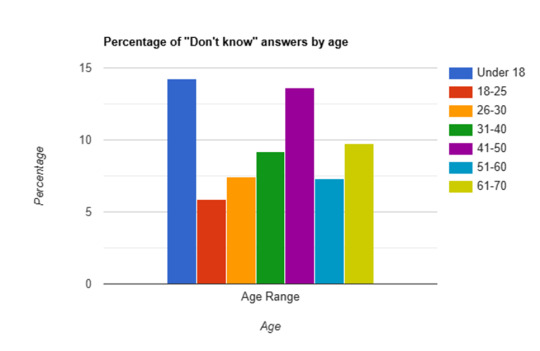
(Figure 1. A chart observing, out of all 16,065 answers, how many equate to “I don’t know?” Under 18: 14.24%, 18-25: 5.9%, 26-30: 7.43%, 31-40: 9.17%, 41-50: 13.63%, 51-60: 7.3%, 61-70: 9.7%)

(Figure 2. A table comparing different categories of people and what percentage of them are unfamiliar with the term “Isekai”; a Japanese term which is most commonly defined as “a trope in which a character somehow travels from the mundane ‘real’ universe into a fictional one.” 23.08% of native English speakers are unfamiliar with the term. 27.07% of non-native English speakers are unfamiliar with the term. 20% of respondents who live in Asia are unfamiliar with the term.)

(Figure 3. A table comparing different categories who mention that “Angst” (defined in fandom context as “dramatic, serious, and sometimes dark”) is an everyday word in German. 12.73% of German speakers mentioned it. 1.38% of people who either do not speak German, or did not mention it in their language background, mentioned it.)

(Figure 4. A table comparing the attitudes of different age groups to the terms “anti-ship” and “pro-ship”. These terms are hotly debated in fandom. Those on the anti side of the debate define anti-ship as “being morally against abuse and pedophilia,” and pro-ship as “excusing abuse and pedophilia in fandom.” Those on the pro side of the debate define anti-ship as “puritanical and chronically online people who can’t separate reality and fiction” and pro-ship as “letting people ship whatever they want and separating reality from fiction.” Those under 18 are 4% anti, 4% pro, and 92% neutral. Those from 18-25 are 2.44% anti, 29.27% pro, and 68.29% neutral. Those from 26-30 are 0% anti, 33.67% pro, and 66.33% neutral. Those from 31-40 are 2.2% anti, 26.37% pro, and 71.43% neutral. Those from 41-50 are 0% anti, 46.15% pro, and 53.85% neutral. Those from 51-60 are 12.5% anti, 37.5% anti, and 50% neutral. Those from 61-70 are 0% anti, 50% pro, and 50% neutral (although, admittedly, there are only two respondents in that group.))
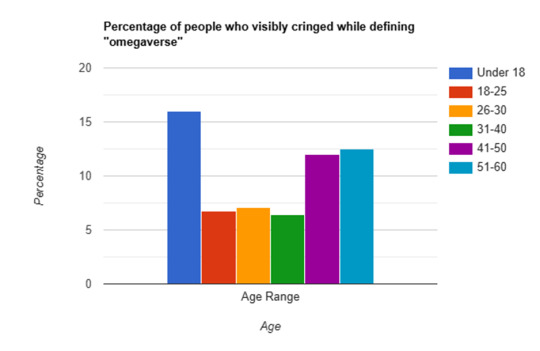
(Figure 5. A chart that shows the rate at which respondents cringed (using phrases such as “please don’t make me define this,” “oh god,” and “Nuh uh. Sorry man. Sweet baby rays good lord.”*) within their responses while defining “Omegaverse” (an erotica subgenre within fandom based on outdated wolfpack dynamics. Very popular, but also very taboo). Under 18: 16%, 18-25: 6.71% 26-30: 7.07%, 31-40: 6.45%, 41-50: 12%, 51-60: 12.5%)
*All real responses I received
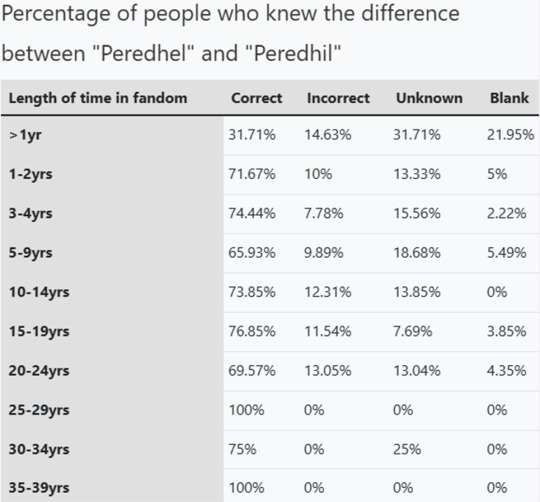
(Figure 6: A chart exploring the differences between who can correctly identify the difference between the terms “peredhel” (half-elf, singular) and “peredhil” (half-elves, plural) based on how long they have been in the fandom. Those who have been in the fandom for less than a year are 31.71% correct and 14.63% incorrect. Those who have been in the fandom for 1-2 years are 71.67% correct and 10% incorrect. Those who have been in the fandom for 3-4 years are 74.44% correct and 7.78% incorrect. Those who have been in the fandom for 5-9 years are 65.93% correct and 9.89% incorrect. Those who have been in the fandom for 10-14 years are 73.85% correct and 12.31% incorrect. Those who have been in the fandom for 15-19 years are 76.92% correct and 11.59% incorrect. Those who have been in the fandom for 20-24 years are 69.57% correct and 13.04% incorrect. Those who have been in the fandom for 25-29 years are 100% correct and 0% incorrect. Those who have been in the fandom for 30-34 years are 75% correct and 0% incorrect. Those who have been in the fandom for 35-39 years are 100% correct and 0% incorrect.)
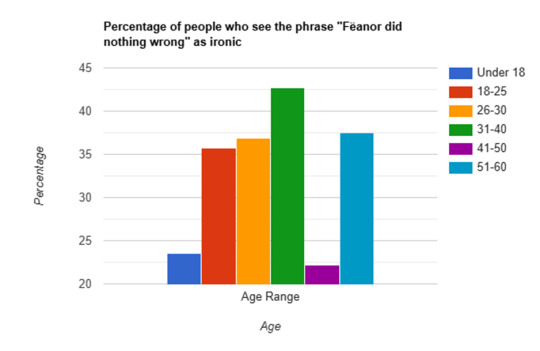
(Figure 7a. A chart observing who sees the phrase “Fëanor did nothing wrong as ironic” divided by age. Under 18: 23.53%, 18-25: 35.77%, 26-30: 36.9%, 31-40: 42.67%, 41-50: 22.22%, 51-60: 37.5%)
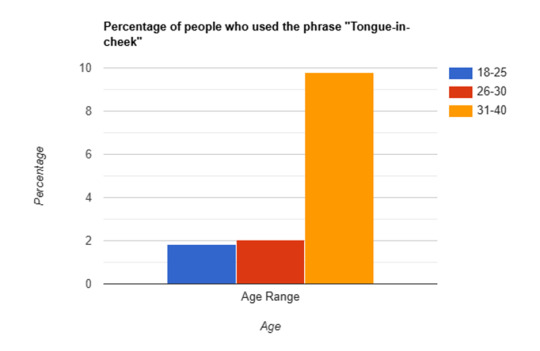
(Figure 7b. A chart observing the percentages of age groups who used the phrase “tongue-in-cheek” while answering the above question. 18-25: 1.84%, 26-30: 2.04%, 31-40: 9.78)
Discussion
Observing these results, I can see that, while there is some level of stratification by age and length of time spent in the fandom, it is not nearly as dramatic as I had expected it to be. These results strongly demonstrate the power of communities of practice. These people, across ages and continents, communicate so often and so deeply, that nearly all terms are understood to the same degree by everyone, and nearly everyone has similar stances on divisive pan-fandom debates.
Were I to do this study again, or a similar study in the future, I would probably narrow the purview by a lot. I would ask fewer questions (or at least, only ask questions of a single type), compare them against only one demographic question, and sincerely consider making them multiple choice. That being said, I do not regret this survey having short answer questions. There were several definitions of several terms that I never could have come up with in a million years. Synthesizing the short answers may have taken more effort on my part, but I learned a lot about my fandom.
@proship-anti-discussion (ship debate was mentioned)
#silmarillion#fandom#linguistics#survey says#silmarillion survey#fandom survey#academia#nerd shit#graphs#charts#tables#isekai#angst#antishiping#proshipping#omegaverse#peredhel#peredhil#feanor#fëanor#fëanor did nothing wrong#fandom discourse#fandom meta
83 notes
·
View notes
Text


ENJOU YOU LITTLE SHIT-
edit: turns out this kokuchuu and the one actually used for enjou have different kanji for koku so his name probably actually meant "in the valley", but this is funnier to me
#enjou#the thing calling itself enjou#sanka#the thing calling itself sanka#kokuchuu#the thing calling itself kokuchuu#bestie can you stop with all the names#my tags are getting too long#genshin impact#fun fact: he's still a linguist nerd#all of his aliases have been in japanese aka (to him) byakuyakokun#genshin enjou
71 notes
·
View notes
Text

Linguistics time
I was thinking about this:
In Japanese, Skully's name (スカリー) sounds similar to the word "すっかり" (sukkari), which can be translated as "completely", "thoroughly" or "entirely".
This word is normally used with states, emotions, or even time. It suggests that something has happened so fully that nothing remains of the previous state.
It also emphasizes the completeness of a transformation or realization and can imply that the change was somewhat inevitable or expected, even if it happened gradually.
"すっかり" is often used in contexts related to memory. For example:
彼の名前をすっかり忘れてしまった "I completely forgot his name" すっかり here emphasizes that the memory is gone, with no trace of recall.
Now, look at this example specifically - it's such a bittersweet or even sad sentence in relation to the Nightmare event if you understand Japanese. It is spelled like - Kare no namae o sukkari wasurete shimatta...
*An interesting (and challenging yes) aspect of Japanese is that you often need to listen to the sentence until the end to fully understand it. Here, the first part can sound like "His name is Skully" if you change を to は. So, at first, you might think you remember his name, but then at the end, you realize you've completely forgotten it... like watching the event to the end and realizing this.....
Some other examples:
すっかり忘れ去る – “to completely forget and move on” This is pronounced as sukkari wasuresaru, and you could even imagine it as "forget Skully and move on" because it sounds similar :)
Or this one:
すっかり夢中になる – “to become completely absorbed in something" Pronounced sukkari muchū ni naru, with muchū (夢中) written with kanji meaning "dream" and "inside". It could even be interpreted as "Skully is inside a dream" if you're as delusional as me :) Or about yumeing, because "yume" (夢) is written with this "dream" kanji too, so it could remind us of "being in the middle of yumeing with Skully" :))
So yeah... I love you, Japanese language and TWST writers...
#i'm a linguistics nerd sorry#twisted wonderland#skully j graves#skully j. graves#twst skully#twst#twst jp#twst nightmare before christmas#linguistics#caligo's translations
89 notes
·
View notes
Text
HOW CURRENCIES GOT THEIR NAMES 🤑💰💸
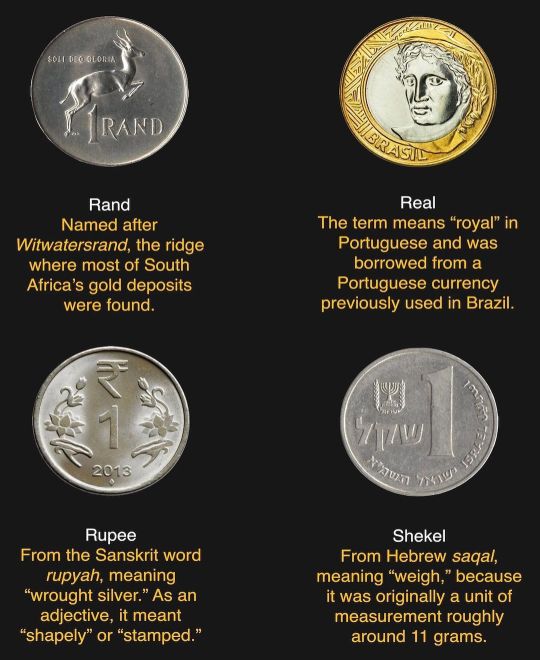




Credit to etymologynerd [Instagram]
#etymology#linguistics#nerd#money#💰#daily#infographic#infographics#currency#economics#history#socioeconomics
212 notes
·
View notes
Text

Pre-Passione/Pre-Incident melone how I love you
#mr Marcello Marco......#the platinum prep nerd#he was meant to be pursuing a university degree in linguistics.... he had a scholarship and a bright future.....#headcanon pasts how I love you#jjba#jojos bizarre adventure#jjba part 5#vento aureo#golden wind#melone#jjba melone#melone jjba#jjba fanart#my art#he wears those glasses purely for aesthetic btw
57 notes
·
View notes